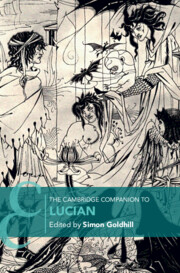Book contents
- Frontmatter
- Contents
- List of Figures and Tables
- List of Contributors
- 1 Introduction
- Part I
- 2 Lucian and the Culture of Criticism
- 3 Lucian’s Poetics
- 4 Lucian and Philosophy
- 5 On Believing in Lucian: The Religious Polemics
- 6 Lucian and Art History
- 7 Some Queer Entanglements in Lucian’s Erotes
- Part II
- Part III
- References
- Index Locorum
- Subject Index
- Cambridge Companions to Literature
3 - Lucian’s Poetics
from Part I
Published online by Cambridge University Press: 07 November 2024
- Frontmatter
- Contents
- List of Figures and Tables
- List of Contributors
- 1 Introduction
- Part I
- 2 Lucian and the Culture of Criticism
- 3 Lucian’s Poetics
- 4 Lucian and Philosophy
- 5 On Believing in Lucian: The Religious Polemics
- 6 Lucian and Art History
- 7 Some Queer Entanglements in Lucian’s Erotes
- Part II
- Part III
- References
- Index Locorum
- Subject Index
- Cambridge Companions to Literature
Summary
Lucian is an author inextricably connected to prose. In this chapter, I argue that poetry is a crucial and overlooked aspect of his literary identity. After an initial account of the striking presence of poetry in Lucian’s oeuvre and in wider Second Sophistic intellectual production, which operates beneath and beyond statements of disdain and disavowal, I turn to a close examination of three very different pieces of Lucian’s verse writing – from remixed tragic and epic ‘quotations’ in the Menippus and Zeus Tragoedus, to the ghostly new Homeric compositions in the True Histories – and highlight some key features of a Lucianic poetics. I ultimately suggest how this poetics articulates Lucian’s wider approach to the literary tradition, and his perception of his own role in continuing it. Lucian’s new-old verse provides him with a self-constructed mandate to reanimate the genres and conventions of the inherited past, to deflate them, disrupt them, and ultimately repossess them.
- Type
- Chapter
- Information
- The Cambridge Companion to Lucian , pp. 50 - 77Publisher: Cambridge University PressPrint publication year: 2024

